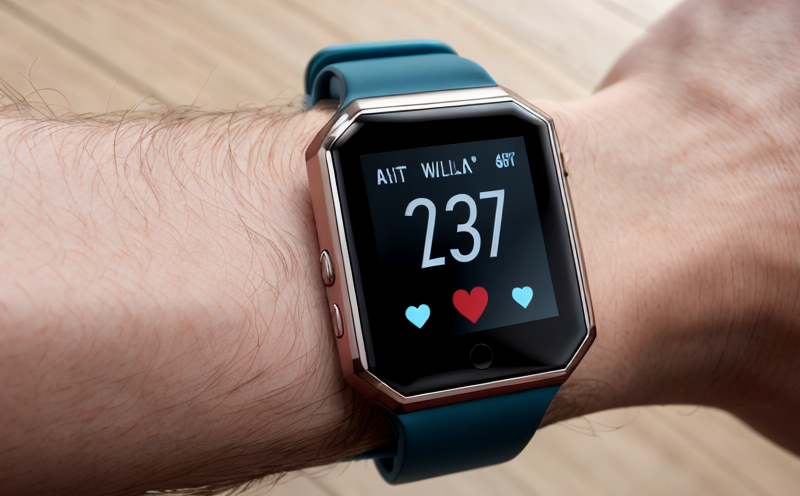IEC 62133 Rechargeable Battery Safety Testing for Wearables
The International Electrotechnical Commission's (IEC) standard IEC 62133 is a globally recognized safety specification for rechargeable batteries used in electronic devices. This standard ensures that all rechargeable battery systems intended for use in portable or mobile electronics are safe from potential hazards such as overheating, short-circuiting, and explosive failures.
The wearables industry has seen exponential growth over the past decade with products ranging from fitness trackers to smartwatches. However, the complexity of wearable technology necessitates rigorous testing to ensure that all components—especially batteries—are safe for prolonged use. IEC 62133 provides a robust framework for evaluating battery safety in these devices.
The standard covers various aspects including battery design, construction, and operational parameters. For instance, it mandates tests such as overcharge protection, short-circuit protection, thermal stability, and more. These tests are critical to ensuring that wearable devices meet stringent safety standards set by regulatory bodies worldwide.
At EuroLab, our expertise lies in providing comprehensive IEC 62133 testing services for rechargeable batteries used in wearables. Our state-of-the-art facilities and experienced engineers ensure accurate and reliable testing results that meet international standards. Whether you are a manufacturer looking to comply with regulatory requirements or an R&D engineer seeking to optimize your product design, our team can provide the necessary support.
Our services include:
- Battery Design Evaluation: We analyze the battery design and structure to identify potential risks and suggest improvements.
- Overcharge Protection Testing: Ensuring that your wearable device can handle excessive charging without damage or risk of fire/explosion.
- Short-Circuit Protection: Testing to ensure that your device can withstand accidental short circuits safely.
- Thermal Stability Testing: Assessing how well the battery performs under extreme temperatures, which is crucial for wearable devices often worn on the body.
- Battery Capacity and Energy Density Measurement: Determining the actual performance of your batteries in real-world conditions.
- Compatibility Checks: Ensuring that all components within the device are compatible with IEC 62133 requirements.
- Environmental Stress Testing: Simulating various environmental conditions to ensure long-term durability and safety.
- Compliance Reporting: Providing detailed reports compliant with international standards, helping you meet regulatory requirements.
In summary, IEC 62133 testing is essential for ensuring that your wearable device's battery performs safely under all conditions. By partnering with EuroLab, you can rest assured that your products will not only pass stringent safety checks but also meet market expectations.
Industry Applications
| Application | Description |
|---|---|
| Fitness Trackers | Ensure safety and reliability of the battery powering your fitness tracker. |
| Sleep Monitors | Test the battery's performance under various conditions to ensure accurate data collection. |
| Smartwatches | Evaluate the battery's ability to power complex features while maintaining safety standards. |
| Medical Devices (e.g., Blood Glucose Monitors) | Guarantee that your device's battery operates safely and reliably, especially in critical healthcare applications. |
| Wireless Headphones | Ensure the safety of the battery powering your headphones, which are often worn for extended periods. |
| Virtual Reality (VR) Devices | Evaluate the battery's performance in complex VR headsets to ensure long-term stability and safety. |
| Smart Glasses | Test the battery powering smart glasses, which are designed for prolonged use and must be safe under all conditions. |
The applications listed above highlight the versatility of IEC 62133 testing in ensuring that rechargeable batteries used in wearable devices meet strict safety criteria. By adhering to these standards, manufacturers can enhance user confidence and trust while complying with global regulations.
EuroLab Advantages
At EuroLab, we pride ourselves on offering unparalleled service when it comes to IEC 62133 testing for rechargeable batteries used in wearables. Our unique advantages include:
- Comprehensive Testing Capabilities: We offer a full suite of tests required by IEC 62133, ensuring that your device's battery is thoroughly evaluated.
- Expertise in Wearable Technology: Our team has extensive experience working with wearable devices, allowing us to provide tailored testing solutions for your specific needs.
- State-of-the-Art Facilities: Equipped with the latest technology and equipment, our labs ensure accurate and reliable test results.
- Regulatory Compliance: Our reports are compliant with international standards, ensuring that you meet all necessary regulatory requirements.
- Fast Turnaround Times: We understand the importance of timely delivery and strive to provide quick turnaround times without compromising on quality.
- Confidentiality: Your data and results remain confidential, allowing us to maintain a trusted relationship with our clients.
- Customer Support: Our dedicated customer support team is always available to answer your questions and assist you throughout the testing process.
Choose EuroLab for your IEC 62133 testing needs, and experience the difference in quality and service.
Competitive Advantage and Market Impact
By incorporating rigorous IEC 62133 testing into your product development process, you can gain several key advantages:
- Enhanced Product Safety: Demonstrating that your wearable device's battery meets the highest safety standards will build trust with consumers.
- Achieving Regulatory Compliance: Ensuring compliance with international regulations can help you avoid costly fines and penalties.
- Innovation Leadership: Offering safer, more reliable products can set you apart from competitors in a crowded market.
- Increased Customer Confidence: Safe products lead to satisfied customers who are more likely to recommend your brand to others.
- Improved Brand Reputation: A reputation for safety and quality can significantly boost your brand's image, attracting new customers.
- Potential for Market Expansion: Demonstrating compliance with international standards can open doors to new markets and opportunities.
In an industry where trust is paramount, IEC 62133 testing not only protects users but also strengthens your position in the market. Partnering with EuroLab ensures that you are at the forefront of safety and innovation.





